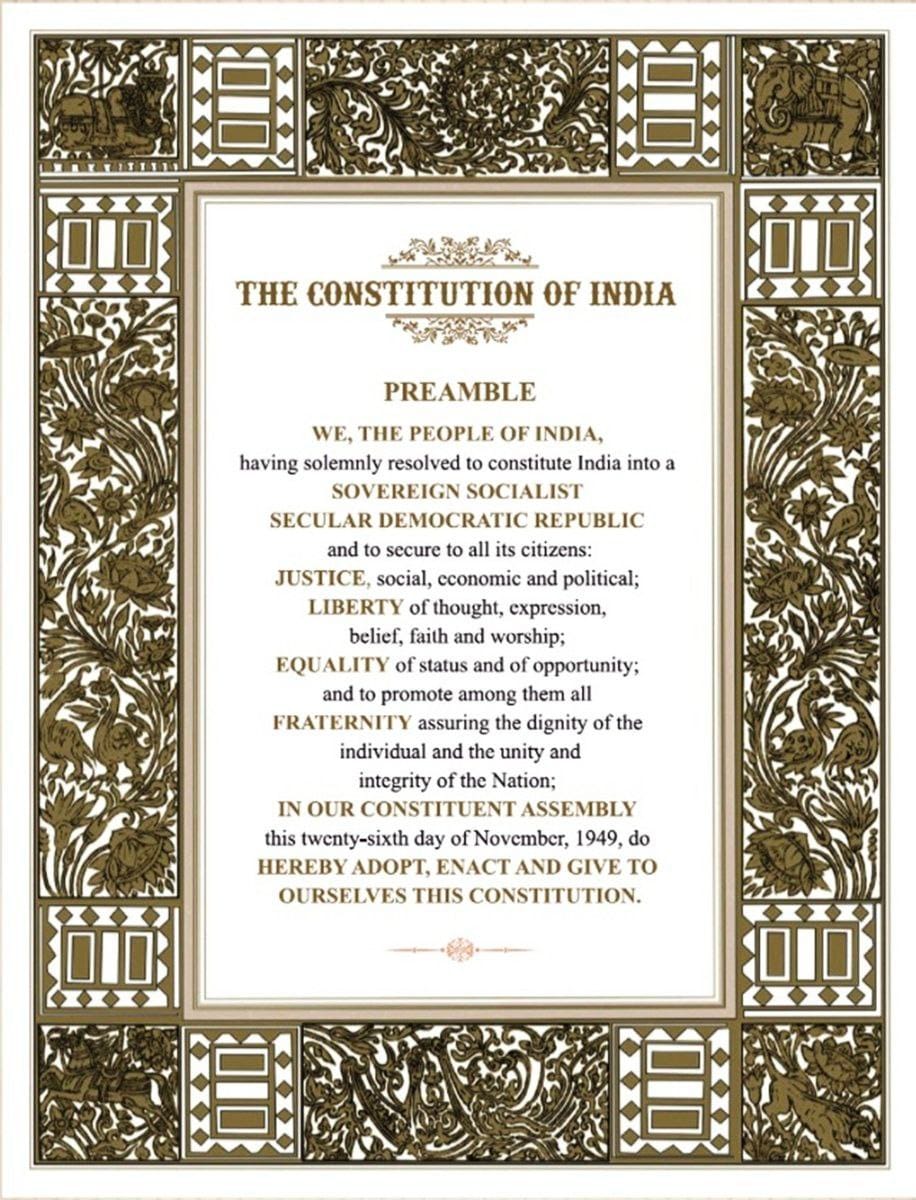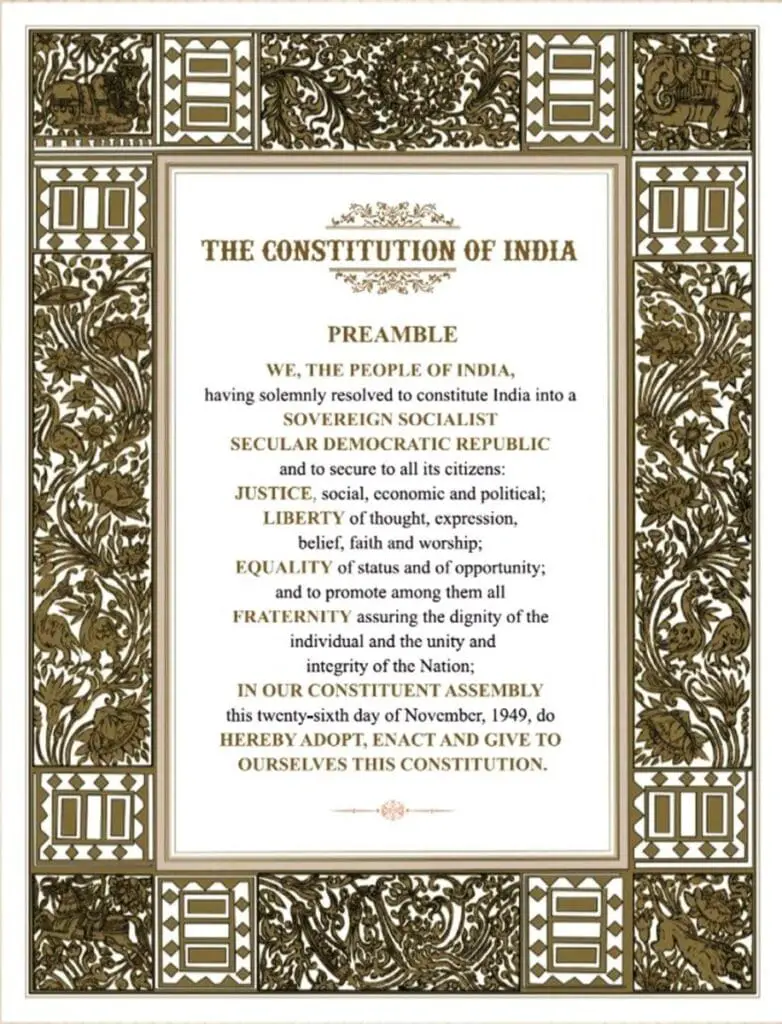

The Preamble of the Indian Constitution is a brief introductory statement that outlines the guiding principles and philosophy on which the Constitution is based. It reflects the fundamental values and vision for India as a sovereign nation. Though it is not enforceable in a court of law, the Preamble is an integral part of the Constitution and serves as a guide to interpreting the provisions of the document.
Text of the Preamble:
“WE, THE PEOPLE OF INDIA, having solemnly resolved to constitute India into a SOVEREIGN SOCIALIST SECULAR DEMOCRATIC REPUBLIC and to secure to all its citizens:
JUSTICE, social, economic and political;
LIBERTY of thought, expression, belief, faith and worship;
EQUALITY of status and of opportunity;
and to promote among them all
FRATERNITY assuring the dignity of the individual and the unity and integrity of the Nation;
IN OUR CONSTITUENT ASSEMBLY this twenty-sixth day of November, 1949, do HEREBY ADOPT, ENACT AND GIVE TO OURSELVES THIS CONSTITUTION.”
Features of the Preamble:
1. “We, the People of India”
- The Preamble begins with this phrase, signifying that the Constitution derives its authority from the people of India. It establishes the principle of popular sovereignty, meaning that the people are the ultimate source of power and legitimacy for the government.
- This reflects the democratic essence of the Constitution, where the people, through their elected representatives, make laws and decisions for the nation.
2. Sovereign
- India is a sovereign state, meaning that it has absolute and independent authority over its internal and external affairs. It is free from the control of any external power.
- This means that India has the right to make its own laws, policies, and decisions without interference from any foreign authority or colonial power.
3. Socialist
- The term socialist was added to the Preamble by the 42nd Amendment Act of 1976. It reflects the commitment of the Indian state to work toward reducing economic inequalities, ensuring equitable distribution of wealth, and promoting social welfare.
- Indian socialism is not a rigid state-controlled economy but emphasizes a mixed economy, where both the public and private sectors coexist. The state plays a key role in promoting social justice and welfare policies, ensuring that wealth is not concentrated in the hands of a few.
4. Secular
- The word secular was also introduced by the 42nd Amendment Act of 1976. It indicates that India has no official state religion and treats all religions equally.
- The state guarantees individuals the freedom to profess, practice, and propagate any religion, or choose not to follow any religion. Secularism in India implies equal respect for all religions, ensuring no religious discrimination or favoritism.
5. Democratic
- India is described as a democratic republic, which means that the government is elected by the people through a system of universal adult suffrage (right to vote) and functions according to the will of the people.
- Democracy in India is representative in nature, where citizens elect their leaders to represent them at various levels of government. The key principles include free and fair elections, rule of law, accountability, and protection of fundamental rights.
6. Republic
- The term republic means that the head of state, the President of India, is an elected representative, not a hereditary monarch. The President is elected indirectly by an electoral college for a fixed term.
- The idea of a republic ensures that power is held by elected individuals, ensuring equality and accountability, rather than being passed through dynastic lines.
Objectives of the Preamble:
The Preamble outlines four key objectives or goals that the Indian state seeks to secure for its citizens:
1. Justice: Social, Economic, and Political
- Social Justice: Aims to remove social inequalities and discrimination based on caste, gender, religion, etc. The Constitution seeks to create a just society by promoting social welfare policies and ensuring equal access to opportunities.
- Economic Justice: Seeks to bridge the gap between the rich and poor, providing everyone with equal opportunities to earn a livelihood, promoting fair distribution of wealth, and preventing exploitation.
- Political Justice: Guarantees equal political rights, including the right to vote and participate in the democratic process, regardless of one’s socio-economic background.
2. Liberty: Thought, Expression, Belief, Faith, and Worship
- The Preamble guarantees liberty to every individual. It aims to protect personal freedoms, ensuring that individuals can think freely, express their ideas, practice their religion, and follow their beliefs without undue interference from the state or society.
- These liberties, however, are not absolute and are subject to reasonable restrictions to maintain public order, morality, and health.
3. Equality: Status and Opportunity
- The Constitution promises equality of status and opportunity to all citizens. This means that every individual should be treated equally under the law, without discrimination based on caste, gender, religion, or socio-economic status.
- Equality of opportunity refers to providing equal chances to all citizens to develop their potential, whether in education, employment, or other fields of life.
- The state can take affirmative action to uplift marginalized groups, like reservations for Scheduled Castes (SCs), Scheduled Tribes (STs), and Other Backward Classes (OBCs), to ensure substantive equality.
4. Fraternity: Assuring the Dignity of the Individual and Unity and Integrity of the Nation
- Fraternity refers to promoting a sense of brotherhood and solidarity among all citizens. It ensures that all individuals respect each other’s rights and live in harmony, regardless of differences in religion, language, or culture.
- The Preamble emphasizes that fraternity is essential to assure the dignity of the individual and to preserve the unity and integrity of the nation. This means fostering a spirit of national unity, promoting the idea of India as one nation, while respecting its diversity.
Importance of the Preamble:
1. Source of Authority
- The Preamble declares that the Constitution derives its authority from the people of India. This underscores the sovereignty of the Indian people and their right to self-governance.
2. Reflection of Constitutional Values
- The Preamble encapsulates the core values of the Constitution—justice, liberty, equality, and fraternity—which are the foundational pillars of Indian democracy. These values guide the interpretation of the Constitution’s provisions.
3. Interpretive Aid
- While the Preamble is not legally enforceable, it plays a crucial role in interpreting ambiguous provisions of the Constitution. Courts, including the Supreme Court of India, have referred to the Preamble in landmark judgments to ascertain the spirit of the Constitution.
4. Expression of National Goals
- The Preamble reflects the aspirations and objectives of the Indian state. It serves as a vision statement, guiding the government and citizens in realizing the ideals of democracy, social justice, and national unity.
Role in Constitutional Interpretation:
- Kesavananda Bharati Case (1973): In this landmark case, the Supreme Court held that the Preamble is part of the Constitution and can be used to understand its basic philosophy. However, it also ruled that while the Preamble is an essential part, it is not the source of any substantive powers.
- Basic Structure Doctrine: The Court also held that the basic structure of the Constitution cannot be amended, and the principles enshrined in the Preamble (sovereignty, democracy, secularism, etc.) form part of this basic structure.
Conclusion:
The Preamble of the Indian Constitution serves as a mirror of the nation’s aspirations, reflecting the hopes, values, and principles on which the Constitution is based. It encapsulates the vision of a sovereign, socialist, secular, democratic, and republican India, where justice, liberty, equality, and fraternity are guaranteed to all citizens. It is both a declaration of the goals of the Indian polity and a guide to the spirit in which the Constitution must be interpreted and implemented.







